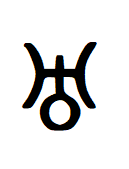
Introduction:
In the vast expanse of Western astrology, Uranus emerges as a celestial catalyst of innovation, change, and awakening. Often referred to as the “Great Awakener” or the “Cosmic Revolutionary,” Uranus’s influence ushers in unexpected shifts, breaking down stagnant patterns and propelling us toward higher realms of consciousness. This comprehensive exploration delves into the profound significance of Uranus in astrology, unravelling its symbolism, energetic influence, and its transformative role in shaping birth charts and astrological interpretations.
The Symbolism of Uranus:
Uranus, as the archetype of innovation and change, embodies the spirit of individuality, rebellion, and unconventional thinking. Its energy disrupts existing norms, inviting us to break free from societal constraints and embrace our true, authentic selves. The lightning bolts associated with Uranus represent the sudden flashes of insight that spark revolutionary ideas and lead to personal and collective transformation.
Uranus’s Astrological Placements:
Uranus’s placement within an individual’s birth chart offers insights into their approach to change, innovation, and the way they navigate the unexpected. As Uranus transits through different zodiac signs, and ushers in periods of revolution and evolution for different generations.
Uranus in Aries: This placement stimulates a need for independence and the courage to pioneer new paths. Individuals with Uranus in Aries are often catalysts for change and innovation.
Uranus in Taurus: Taurus Uranus challenges conventional notions of stability and values, urging individuals to embrace radical shifts in their approach to material and sensual desires.
Uranus in Gemini: Gemini Uranus encourages unconventional communication, inspiring individuals to revolutionize how they express ideas and connect with others.
Uranus in Cancer: This placement brings about change within the realm of emotions, family dynamics, and domestic structures, prompting individuals to redefine what “home” means to them.
Uranus in Leo: Leo Uranus encourages unconventional self-expression and challenges traditional notions of creativity and identity.
Uranus in Virgo: Virgo Uranus fosters innovation in health, work, and daily routines, pushing individuals to embrace new technologies and unconventional methods.
Uranus in Libra: This placement revolutionizes relationships and social dynamics, challenging traditional norms and urging individuals to embrace equality and authenticity.
Uranus in Scorpio: Scorpio Uranus prompts deep psychological transformation and brings about shifts in how we approach shared resources, power dynamics, and hidden truths.
Uranus in Sagittarius: Sagittarius Uranus sparks a revolution in belief systems, philosophy, and higher education, encouraging individuals to expand their horizons and embrace new perspectives.
Uranus in Capricorn: This placement challenges traditional structures of authority and governance, urging individuals to find innovative ways to create lasting change within societal systems.
Uranus in Aquarius: As the ruler of Aquarius, Uranus’s influence is strong here, promoting humanitarian efforts, individuality, and unconventional approaches to solving societal issues.
Uranus in Pisces: Pisces Uranus prompts a spiritual revolution, inviting individuals to explore new dimensions of consciousness, empathy, and creativity.
Uranus’s Influence on Personal Transformation:
Uranus’s placement in an individual’s birth chart offers a glimpse into their potential for innovation, embracing change, and breaking free from societal norms. Embracing the energy of Uranus’s zodiac sign empowers individuals to awaken their unique genius, challenge outdated beliefs, and embark on a journey of self-discovery.
Uranus’s Role as a Catalyst for Change:
Uranus’s influence often arrives with unexpected events or insights that catalyse transformation. These events can feel disruptive, but they ultimately lead to personal growth, liberation, and alignment with one’s true purpose.
Uranus’s Aspects in Astrology:
The aspects Uranus forms with other planets in an individual’s birth chart provide insights into their capacity for change, innovation, and their approach to embracing the unexpected. Harmonious aspects like trines and sextiles suggest an ease in integrating innovative ideas into their lives, while challenging aspects like squares and oppositions reveal areas where resistance to change may be present.
A Uranus-Mercury trine may signify a natural aptitude for inventive thinking and communication, while a Uranus-Saturn square might point to tension between embracing change and clinging to tradition.
Uranus in Synastry and Relationships:
In synastry, Uranus’s position and aspects shed light on the dynamics of freedom, individuality, and the role of change within relationships. Harmonious Uranus connections often signify relationships that encourage personal growth and self-expression. Challenging Uranus aspects in synastry may highlight conflicts between the need for independence and the desire for stability.
Uranus’s Influence on Innovation and Creativity:
Uranus’s placement in an individual’s birth chart also influences their approach to innovation, creativity, and embracing unconventional ideas. By aligning their creative pursuits with Uranus’s energy, individuals can tap into their capacity to think creatively, challenge the status quo, and bring fresh perspectives to their creative endeavours.
Conclusion:
Uranus, the cosmic catalyst, propels us beyond the boundaries of the known into the realm of the possible. As the archetype of change and innovation, Uranus’s influence encourages us to embrace our individuality, challenge societal norms, and awaken to new dimensions of consciousness. By understanding Uranus’s symbolism, its astrological placements, aspects, and its transformative role in personal growth, we open ourselves to the electrifying currents of change and embark on a revolutionary journey guided by the celestial wisdom of astrology. In the grand tapestry of the universe, Uranus remains a beacon of illumination, inspiring us to illuminate our paths with the spark of innovation and embrace the extraordinary within ourselves.
Summary
Uranus
Rules the sign of Aquarius.
Rules the eleventh house.
In detriment in Leo, exalted in Scorpio and in its fall in Taurus.
Takes about 84 years to complete one cycle.
Transits: It spends around 7 years in each sign. It retrogrades every year, for about five months.
Symbolises: the originality, innovation, and rebellion of the individual. It also represents the change, revolution, and awakening that challenge the status quo and create a new world order.
Shows: the “how” (sign) and the “where” (house) we express our uniqueness, eccentricity, and genius. It also indicates our style of breaking free, experimenting, and inventing.
Other Associations: the god of the sky, the electricity, the technology, the science, the astrology, and the air element.
Correlations with Body or Health: the nervous system, brain, circulation, ankles, and calves. Uranus can also affect physical or psychological issues that influence the health and vitality.
Positive characteristics: brilliant, inventive, original, humanitarian, progressive, and visionary.
Negative characteristics: erratic, unpredictable, rebellious, disruptive, detached, and stubborn.
Note:
The outer planets of Uranus, Neptune, and Pluto are generational planets. Their orbits span significantly longer durations compared to the personal and societal planets (Mercury, Venus, Mars, Jupiter, and Saturn). This extended orbital journey allows them to spend considerable time in each zodiac sign. Consequently, their astrological impact becomes imprinted on an entire generation of individuals born during that specific period.
Generational planets exert their influence on an individual’s birth chart by shaping the collective consciousness, societal trends, and historical events of a particular era. They encapsulate the overarching themes and shared struggles that define a generation as a whole, while also influencing the generation’s responses to these challenges. Additionally, they signify the potential for profound transformation and growth at both the individual and collective levels.
References
Woolfolk, Joanna Martine. The Only Astrology Book You’ll Ever Need. Taylor Trade Publishing, 2012.
Forrest, Steven. The Inner Sky: How to Make Wiser Choices for a More Fulfilling Life. Seven Paws Press, 2001.
Hickey, Isabel. Astrology: A Cosmic Science. CRCS Publications,1992.
Lineman, Rose & Popelka, Jan. Compendium of Astrology. Whitford Press, 1984.
Kent, April Elliott. The Essential Guide to Practical Astrology. Two Moon Publishing, 2016.
Hand, Robert. Horoscope Symbols. Whitford Press, 1981.
Bills, Rex. The Rulership Book. AFA,1971.
Sullivan, Erin. Retrograde Planets: Traversing the Inner Landscape. Weiser, 2006.
Sasportas, Howard. Gods of Change – Pain, Crisis, and the Transits of Uranus, Neptune and Pluto. Wessex, 2013.
